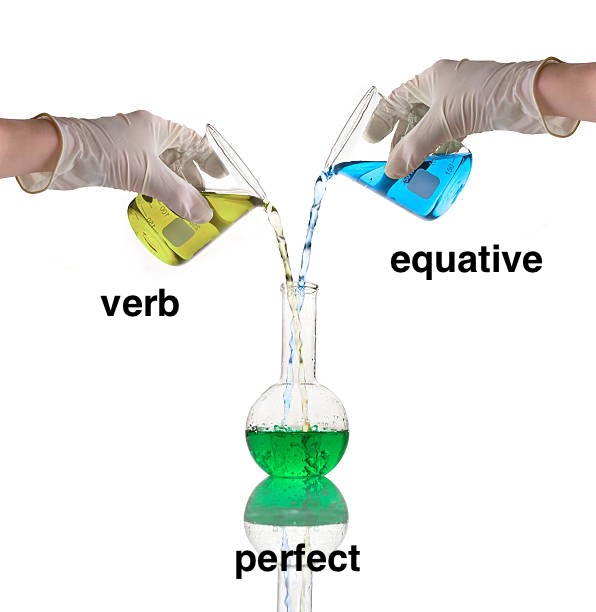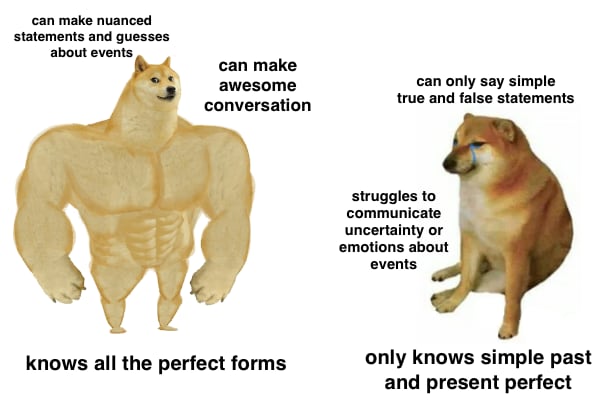All Perfect Forms
In the previous chapter we explained how perfect forms are made by combining the past participle of a verb with an equative.

The nice thing about perfects is that we can use any of the 8 equatives. This gives us a huge amount of expressive power to talk about whether something has happened, had happened, will have happened, might have happened, would have happened, what you wish would have happened etc. etc.

With the power of perfect forms, we can inject our verb phrases with all the meanings of the 8 different equative tenses.
Present Perfect
Verb Past Participle + Present Equative
The present perfect is used to talk about events that have happened in the past and therefore have an effect on the current situation, now.
Without the equative
Often the equative is left out with the present equative.
Habitual Perfect
Verb Past Participle + Habitual Equative
The habitual perfect is used to talk about events that are habitually/generally found to be completed, so they tend to have an affect on the situation over and over again, in a habitual fashion.
Subjunctive Perfect
Verb Past Participle + Subjunctive Equative
The subjunctive perfect is used to talk about things being done in a subjunctive way, i.e.:
- wanting something to be done
- saying that something should/must be done
- saying that something is possibly done
- saying if something is done
- saying a purpose, i.e. ...so that something will be done
Future Perfect
Verb Past Participle + Future Equative
The future equative is used to either to:
say that something will be done in the future
guess/presume that something is done now
A. Say something will be done in the future
Notice that even though you might be talking about future events, for the phrase structure this is still considered past tense, because all perfects are considered past tense.
B. Guess about what is currently done
It is 👉 extremely common and useful 👈 to use the future equative to make guesses or presumptions about events being done currently. This is often used in conversation to throw out guesses or estimates, or even ask questions about what might have happened.
With this form of perfect people often add an emphatic خو - kho in the kids' section.
Past Perfect
Verb Past Participle + Past Equative
The past perfect is used to say that an event had been done in the past. For instance, if you are explaining some events in that past, you can use this to that some event had been done back at that point in time.
"Would be" Perfect
Verb Past Participle + "Would be" Equative
Just like the "would be" equative, the "would be" perfect can be used to talk about:
- an event being habitually/repeatedly done in the past
- to presume/guess that an event would have been done in the past
- to say the outcome of a hypothetical conditions
- to say that an event should have happened
Past Subjunctive Perfect
Verb Past Participle + "Past Subjunctive" Equative
Just like the past subjunctive equative, the past subjunctive perfect is used to say:
- If an event were hypothetically done (but it wasn't)
- If you wish an event were done
- If an event should have been done/was necessary in the past
"Would have been" Perfect
Verb Past Participle + "Would have been" Equative
Just like the "would have been" equative, the "would have been" perfect is used to say:
- If some hypothetical condition were true, an event would have been done
- Some event should have been done, it would have been good if some event was done
🎮 Write the perfect verb - all perfect tenses (one verb)
Write the correct perfect form of the verb to complete the phrase
🎮 Write the perfect verb - all perfect tenses (mix)
Write the correct perfect form of the verb to complete the phrase